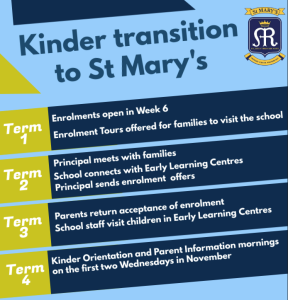At St Mary’s, we aim to ensure the transition into Kindergarten is a smooth and positive experience for all students.
The importance of a positive transition to school has been emphasised in research around the world. It is well established that a successful start to school is linked to later positive educational and social outcomes. Children who have a positive start to school are likely to regard school as an important place and to have positive expectations of their ability to learn and succeed.
Research has found that children learn best when they have a positive self-esteem. A positive self-esteem means the child feels loved and valued and can confidently interact with the world around them. Parents can help develop their child’s self esteem and school readiness by:
- Talking positively about school and education
- Reading to your child regularly as research indicates that this will have a significant influence on a child’s ‘readiness’ for school
- Encouraging children’s efforts
- Encouraging them to socialise regularly with friends of the same age
- Encouraging active lifestyles and creative potential through painting, making things or just running around
- Providing them with responsibility e.g. Setting table/cleaning up after themselves
- Accepting that they will be at a different stage of development and will learn at different rates
- Developing independence
Be aware that each child develops individually and it is very important children enjoy their opportunity to learn.
Religious Education – Sharing your own faith and values with your children. Teaching them how to pray and allowing them to accompany you to church services.
Communication – take time to talk and to listen to your children, discussing the events of the day, asking questions, making observations and planning future activities.
Reading – read to your child, be seen as a reader, give books as presents or rewards, point out different signs in the street or whilst travelling and have plenty of books and print materials in the home.
Writing – let them see you write (notes to friends, shopping lists etc), provide a space for writing, praise their attempts as they begin to mimic writing and give the child various things for writing (pens, pencils, paper, note books, crayons, tracing stencils)
Maths – encourage them to count aloud common objects (pegs when hanging out the washing, animals on the farm), use words such as more/less, equal/below/above, circle/square, name the different types of money and how much things cost. Allow your children to play with blocks to copy shapes, talk about the time (morning or afternoon)
